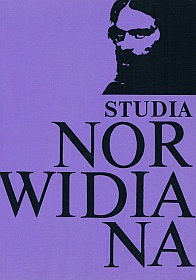Lyricism in Norwid's Drama. The Musicality of Tyrtej [`Tyrtaeus'] and Za kulisami [`In the Wings']
Abstract
Romantic reflection on poetry commonly understood lyricism as melodiousness, musicality and subjectivity. Norwid understood music in two ways, distinguishing sound (empty of content) and tone (linked to specific content). In searching for a musical structure to combine the word, the content and conscience he drew on the ancient model of the universe as the harmony of the spheres. In Tyrtej the chorus in particular is laden with much lyrical expression in that it represents the voice of conscience of Athenian society and the voice of the playwright himself. The absence of chorus marks dead societies, to whom the poet is sent to proclaim the truth.
The dissonance between the level of sound and the level of content is very striking in the lyrical portions of Za kulisami. The duality is signalled in the Dedication, which functions as an operatic overture. The disparity between its „sweet chords” and their real tragic meaning is particularly audible in the closing scene of the play. Strikingly, the author introduces into the finale the familiar children's song Wlazł kotek na płotek, whose words and rhythm render a senseless revolving movement that evokes the closeness of death. It is a grotesque exposition of the hypocrisy of the characters.
Instead of the chorus proclaiming some eternal truth and dancing to the tune of the heavenly spheres, all that the poet, the modern Tyrtaeus, can hear is a creaking revolving mechanism propelled by the wind of popular opinion.
Copyright (c) 2003 Studia Norwidiana

This work is licensed under a Creative Commons Attribution-NonCommercial-NoDerivatives 4.0 International License.





